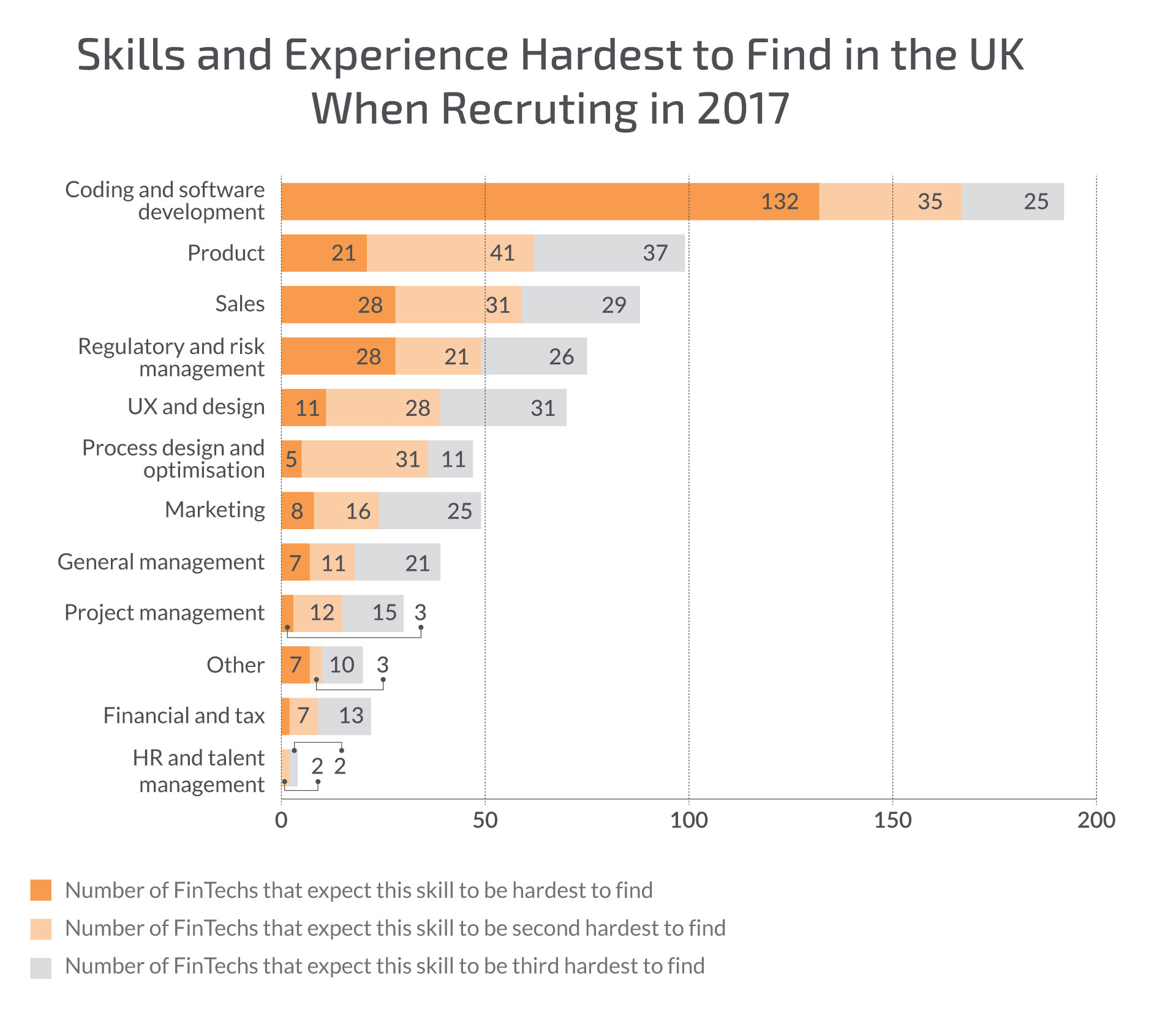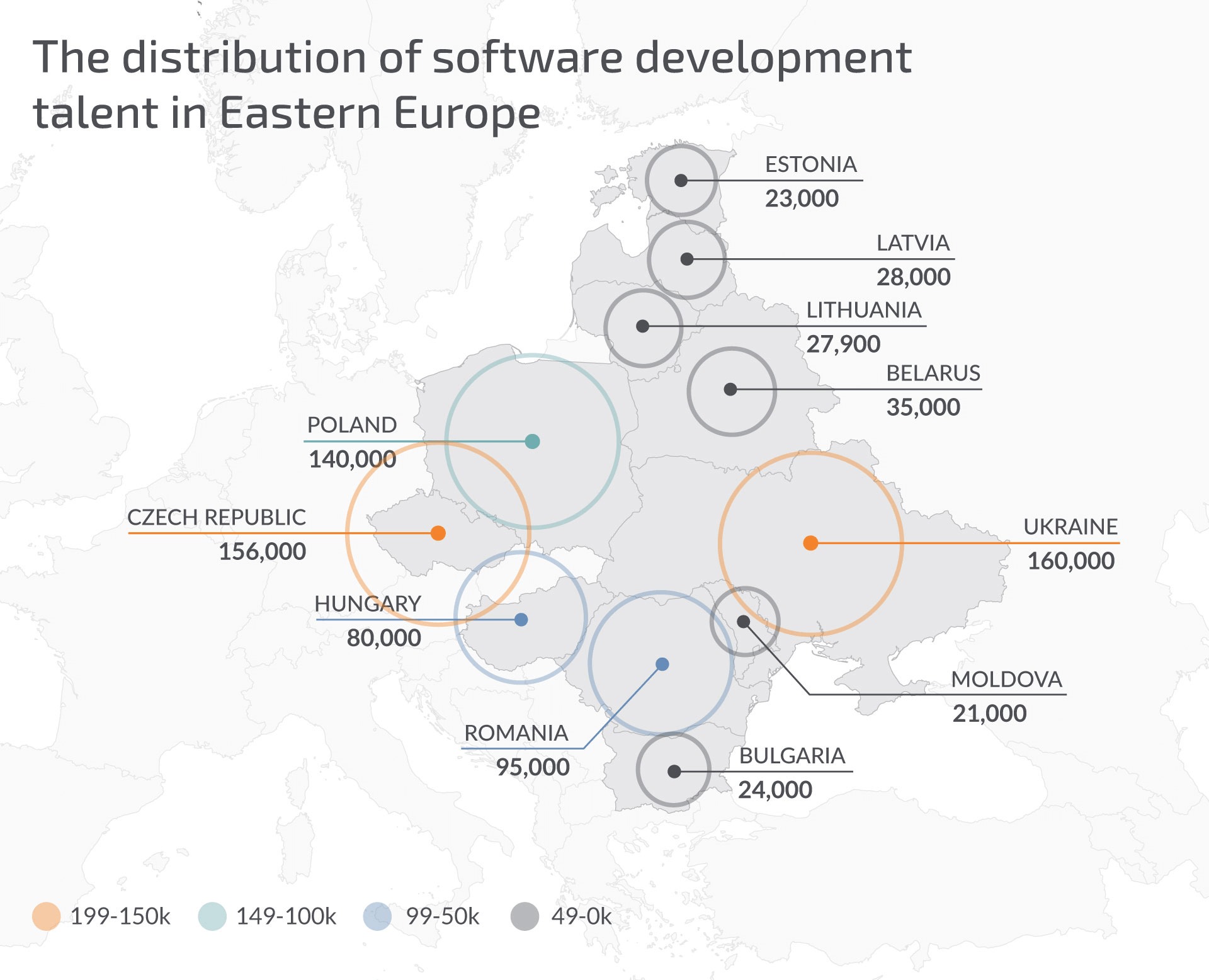When fintech startups prove their idea feasible and start scaling operations, they start ailing from a shared pain. Quick and efficient extending of their teams along with hunting for the necessary talent may be a tall order.
As a result, fintech companies looking to scale up their development encounter the following hurdles:
Finding the suitable expertise for fintech development
58% of respondents of the UK fintech census mentioned engaging qualified and suitable talent as the most significant challenge for fintechs. Due to the galloping pace of IT development and consequently – a burning demand for high-end software engineers, the European Commission expects the shortage of IT-skilled staff could amount to 825,000 by 2020.

Especially that concerns such in-demand specialists as blockchain developers, smart contract developers, data scientists, Machine learning engineers, and other rare experts that are now more and more frequently required for innovative fintech projects. For instance, we can see now many use cases of machine learning in fintech, and how demanded AI and machine learning talent is in fintech domain.
Painful HR activities in-house
What’s more, companies looking to scale up their software development often struggle with HR activities and communication issues. They call for additional effort, costs, and may distract the company from their core focus. And it seems more reasonable to outsource these additional competencies to an offshore or nearshore team.
Where and how to find fintech development talent
Many fintech companies search for a software development partner in Eastern Europe or Asia. Eastern Europe alone gives access to a rich talent pool of software engineers. For instance, CEE is home to over 789, 000 IT specialists, and Ukraine is alone home to 1,000 software development companies. For example, such fintech leaders as CurrencyCloud and Ratesetter cooperated with IT vendors from Eastern Europe.

When looking for a reliable software development company, pay attention to the following factors:
The available pool of specialists. If you want to extend your team quickly, choose mid-size and big companies with 500+ specialists. This way the experts can be easily reallocated to your project.
Also, the company should have solid brand recognition as it will help to find the necessary expertise easier. In fact, most fintech projects are interesting and challenging, and if you choose an established IT outsourcing company with a strong brand image on the market, it won’t be hard to find the development resources you are looking for, including senior software engineers.
The potential software development partner must have expertise in migration to microservices, secure and reliable API design, distributed architecture, and more.
Security can’t be compromised. A potential software development partner must be compliant with top security regulations, laws, and rules, follow the best global practices, and hold information security teams that will be responsible for following all the security procedures. For instance, a fintech company that accepts card payments, stores, processes and transmits cardholder data, must ensure it hosts their data securely with a PCI compliant hosting provider.
To ensure data protection and compliance with GDPR, a company can request the vendor to provide pseudonymization of the data. Pseudonymization is a de-identification procedure by which personal data is replaced by one or more artificial identifiers, or pseudonyms, and thus the IT vendor has no access to actual users’ personal data. Also, the customer can require the IT vendor to work remotely with its data without moving it to servers in Ukraine.
The vendor can offer the cooperation model that best fits needs of your fintech project. If the fintech company is looking to engage a team as a seamless part of their own one yet working remotely, dedicated development model (team extension) is the best option. What’s more, it is the best choice in terms of cost-efficiency for long-term fintech development projects as it allows you to have a more predictable price in the end. Before the project starts, you and the IT vendor decide upon a monthly cost per engineer allocated to your account. A software engineer is typically allocated full-time (160 hrs per month) with a long-term assignment duration (1+ year).
In addition, there is a delivery manager allocated to your account. They will be responsible for business processes integration, technology alignment, setting up, overseeing effective communication, and more.
Flexibility and scalability is another huge advantage. You can either hire a strong team of senior software engineers or engage middle and junior developers that will ensue tasks of your in-house senior engineers. You can scale up or down the team as necessary adding or removing technologies and specialists that work with them.
Fintech companies may choose different approaches to team augmentation. Some companies choose to grow in numbers and hire many junior and middle engineers, delegating minor tasks to their nearshore team. While others choose to empower their outsourcing team with core tasks and decision-making. Both options are fine, and your potential vendor must be able to do both. You can also start from something small, and then when you build the trust with your team, assign them with heavier duties.
Wrap-up
Finding and hiring fintech development talent in-house is painful, time-consuming and costly. What’s more, fintech companies may have very specific resource needs, and some fintech software development experts may be very rare, for instance, blockchain or smart contract developers.
Thus, it makes sense to delegate some of your fintech software development tasks to a nearshore outsourcing vendor. In order to make your cooperation efficient, you need to choose a mature and reliable IT outsourcing partner and the most scalable and flexible cooperation model that best suits your fintech development project.








